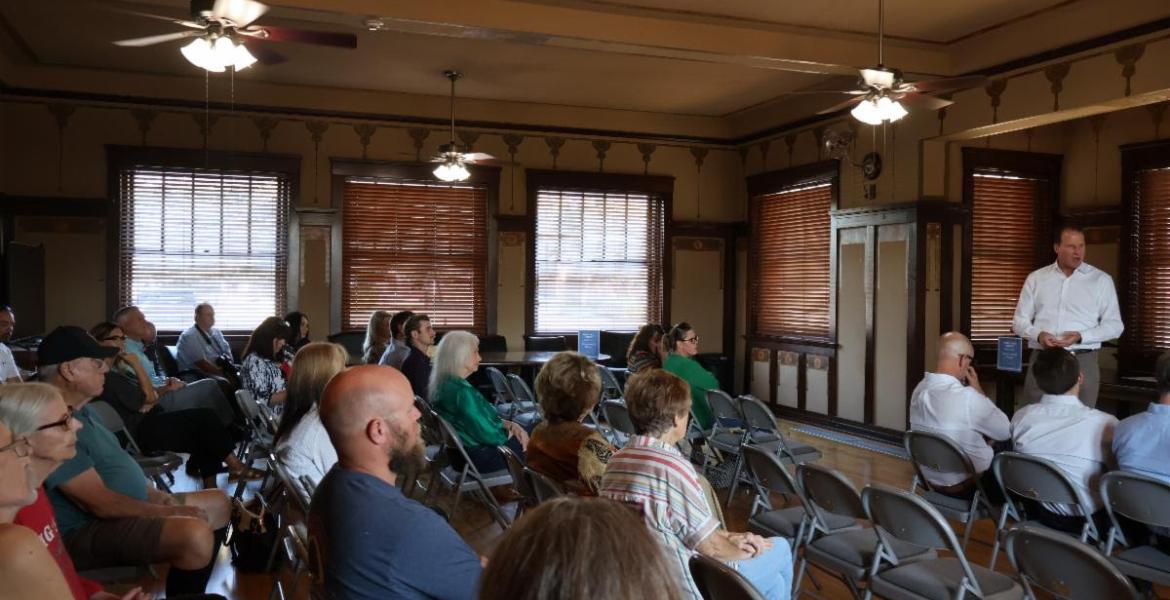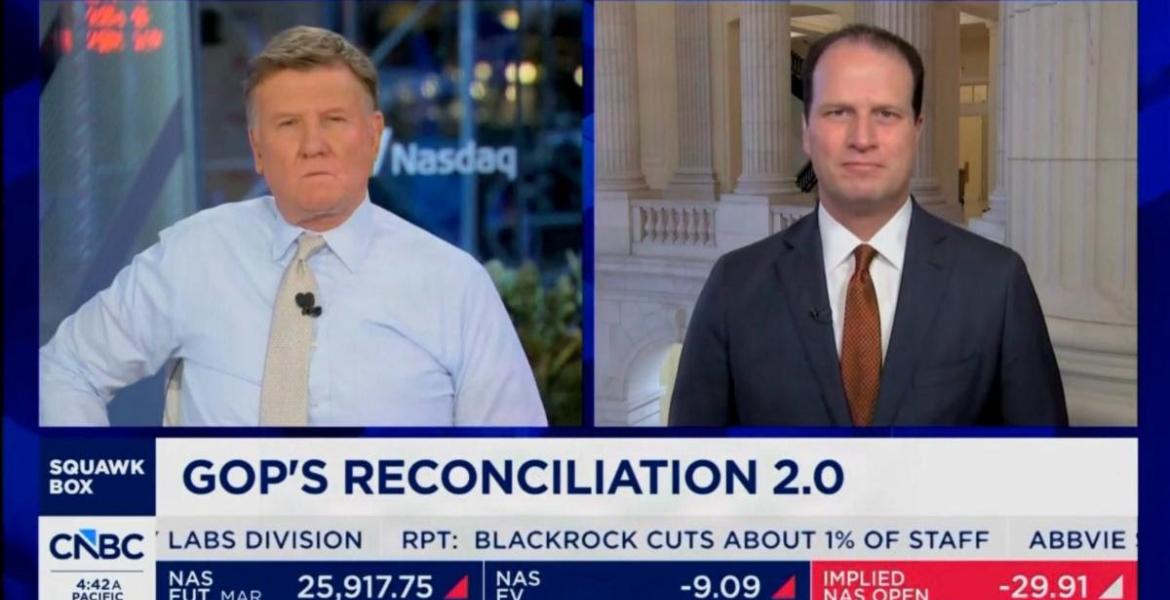San Angelo Mayor Dwain Morrison has his mind made up. “Comparing to two RFPs [Requests for Proposal responses] is like comparing a watermelon to a raisin,” he said, referring to Republic Services winning response to Texas Disposal Systems'. To Morrison, there was no comparison between the two proposals to both pick up trash and manage the landfill, probably for the next decade. The length of the contract, whether it’s five, 10, or 20 years, is decided in the final negotiations.
Shane Kelton, the City Operations Director, said last week that his plan is to put the final, negotiated contract with Republic Services on the July 1st City Council agenda for an up or down vote.
The Players in the Trash Controversy for Newbies
Republic Services was chosen as the sole finalist for the exclusive City trash vendor on April 1st, much to the disagreement of the only other participant in the bidding process, Texas Disposal Systems, or TDS.
Republic is a Fortune 500 corporation that is publicly traded on the New York Stock Exchange (NYSE: RSG) with 30,000 employees worldwide. The heart of its Texas operations come from its acquisition of the former Duncan Disposal, the former entity that handled San Angelo’s trash until the buyout about 20 years ago. Republic has been the sole vendor since.
TDS is a different type of company than Republic. They’re much smaller, with around 650 employees, though certainly a major player in Texas, with trash collections and recycling contracts from San Antonio to Austin, and all the way out west to Alpine, and Eagle Lake to the east.
TDS obtained the first Texas Commission on Environmental Quality (TCEQ) permit for an integrated recycling, compositing and ranching landfill. It’s located on a 2,000-acre facility in Creedmoor, in southeast Travis County. The TDS exotic game ranch located at the landfill features about 1,600 animals (and counting) of over 50 different species.
The TDS business model is to create a recycling eco-system around trash, from collection, diversion, recycling, and even selling compost from recycling operations in a chain of Garden-Ville lawn and garden stores located up and down the I-35 corridor.
Reviewing the RFP Responses
Fancy ranch on a landfill or not, San Angelo’s Mayor Morrison said, as one vote on the seven-member City Council, that his primary concern in selecting a trash collections and landfill management vendor came down to price. Currently, residential trash pickup is part of each resident’s water bill and is just under $10 per month. Morrison is sensitive to his constituents’ pain in paying more.
City staff has reported that the TDS bid was in some areas 64% higher than the Republic bid on residential pickup. Commercial pickup was approximately even.
Bob Gregory, CEO of Texas Disposal, vehemently disagrees with the City’s assessment of the TDS bid. “TDS responded to the RFP with seven different options and rate plans for residential trash and recyclables collection. The service level that the City staff chose to publicize (weekly collection of both trash and recyclables with separate carts) was the highest rate that we provided,” Gregory wrote in a letter responding to a San Angelo Standard-Times letter to the editor written by the City of San Angelo Public Information Officer Anthony Wilson. The newspaper didn’t print Gregory’s reply. We did.
Wilson was careful to detail that the Republic bid was for weekly recyclables pickup, along with the trash. Gregory said in his letter that, “Every other week single stream recycling service is considered the standard service level in most parts of the country. This is because the size of the recycling cart is large enough to be serviced every other week, instead of weekly.”
Councilman Rodney Fleming and Councilwoman Charlotte Farmer agree with the mayor and both are confident that the Republic contract will be the best price option. “The bottom line is getting the best rate for our citizens,” Farmer said in an interview Friday afternoon. Fleming said Friday that everything would be clear once both responses to the RFP are revealed to the public. Both Farmer and Fleming were on the RFP evaluation committee.
Allegations Against Republic
Under the existing contract, the City chose to give Republic an exclusivity arrangement on all residential and commercial trash pickup, as well as the exclusive control of the City-owned landfill. Because the contract is exclusive, Republic must negotiate with the City, who represents the citizens’ interest, for any rate changes or increases. Those increases are voted upon and codified by City ordinance. Any charges over the rates set by law are a breech of contract.
On April 1st, TDS claimed in its cover letter to the City staff in its RFP response that Republic has been overcharging commercial clients. In later revelations, TDS alleged that Republic is illegally charging San Angelo businesses approximately 32 percent more in a surcharge for “Total Fuel/Environmental Recovery Fee [ERF] Fee."
Also subsequently to the initial allegation, TDS has researched the trash bills for Acme Iron and Metal, their San Angelo-based sister company, and those of a few commercial customers. Today, TDS claims that those charges have been in effect for 14 years, equaling $7.9 million to $9.2 million, depending on how the gross trash collection revenue is calculated. LIVE conducted an open records request for San Angelo ISD’s trash invoices from Republic and found that the school district was paying $50,000 per year in ERF/Fuel charges during a 12-month period from April 2013 through March 2014.
City staff said that they were investigating the suspect charges, and have been since about the middle of April.
Farmer said that the 32 percent figure is not correct. It is instead 11 percent, as stated on the Republic Services website. The reason is that in 2006 and again in 2008, to Farmer’s recollection, the City Council authorized Republic to charge a fuel surcharge. “You know, when diesel was headed towards $5 per gallon, I recall Council giving them the option,” she said. Mayor Morrison also recalls the fuel surcharge authorization. “We gave them a sliding scale,” Morrison said. Both Farmer and Morrison were sitting council members at the time. The remaining amount disputed, approximately 11 percent, is the unauthorized ERF, Farmer said.
TDS’ Bob Gregory said that his team could not find an authorization for commercial fuel surcharges, but there are authorizations for residential fuel surcharges. There is a table of commercial fuel charges under commercial rates from the 2013 City ordinance rates, but those rates apply to small, non-dumpster locations such as an accountant's office. "You cannot get to the amount they were charging based on the formulas included in those tables. Commercial rates come from the table on pg. 4-6, from which you cannot get to the rates [currently] charged by Republic," said Adam Gregory in an email.
Farmer is the only City Council member on the City’s audit committee, and was briefed on City Auditor Steve Mahaffey’s investigation. “Republic has been more than gracious and cooperative. I cannot emphasize how great they’ve been to work with,” she said. Farmer said that the audit committee reviewed the findings of the audit of the commercial charges and there will be a press conference held by Republic sometime this week to announce the findings and the resolution. "We specifically asked Republic to conduct that press conference," Morrison said.
Mahaffey told the Standard-Times that the audit report would not be made public. Gregory said, “This is unacceptable to all of the San Angelo businesses that have been overcharged.” Mahaffey also told the Standard-Times that all questions have been answered. Gregory said that couldn’t be the case, because those most harmed, the 3000-4000 San Angelo businesses, were not at the table to ask any questions, and apparently will not be able to review the audit report.
------
Clarification (added at 12 p.m., Monday): Mahaffey called this morning to offer more information on the audit of the existing trash contract. He said that all questions have not been answered in the investigation yet, but is anticipating more information to flow from his office. "My ultimate goal is to provide tranparency to all of our citizens, including commercial businesses affected by this," he said. "At this point, I have given a brief verbal update on the status of the investigation to the audit committee and to the City Management; there is no official written report at this time."
"I have reviewed several commercial bills, including those provided by Mr. Gregory with his concerns. I have reviewed years' worth of council minutes, watched videos of Council meetings, as well as reviewed agendas, minutes and accompanying background information pertaining to them," Mahaffey said.
------
Gregory further asked if the City’s audit committee meets in public?
Mahaffey told the paper that he would brief the committee’s findings to Council in executive session.
Farmer doesn’t blame anyone for the overcharge. “In any business capacity, there’s going to be errors,” she said. “I don’t think there is going to be anything flagrant revealed this week,” she said.
Gregory, who just won a legal battle against the City of Austin this year, has a different viewpoint. “Someone had to make a conscious decision to charge those fees, authorized or not,” he said.
Public Review of the Contract
Morrison said that he is not opposed to allowing the public review the contract for a period of time before the Council meets to vote it up or down. The current trash contract expires July 31st. “I wouldn’t have a problem showing it before we vote on it if it doesn’t jeopardize the City’s position,” he said. Fleming is also in favor of showing it to the public. Having just narrowly won re-election with the trash controversy hanging over his campaign, Fleming said, “I wish we would have put all this out a long time ago.”
The City spokeman Anthony Wilson said, "Background materials for City Council meetings are normally posted on the City's website on the Friday afternoon prior to a Council meeting."
One Hell of a Litigator
TDS has much larger contracts with the City of Austin and the City of San Antonio. Why does TDS’ CEO Bob Gregory care so much about San Angelo? “Because I’m from here. This is my home, too. I care deeply about San Angelo,” Gregory said. Although TDS is based near Austin, the Gregory family still owns San Angelo-based Acme Iron and Metal.
“These trash contracts and TCEQ and EPA rules are daunting and can be confusing,” he said. Gregory explained in City Council meetings late last year that he would like to see the recycling volume in west Texas reach a point where an MRF, or Materials Recovery Facility, that supports single-stream recycling, will be needed in San Angelo. TDS is already hauling municipal trash here, and some curbside recycling pickup for commerical entities, with contracts in Alpine, Mertzon, Sterling City, and Angelo State University. To the casual observer, the surrounding area’s trash can become a local recycling opportunity, and San Angelo could become a hub for these surrounding communities.
Gregory has won at least two David versus Goliath legal battles. One was a defamation lawsuit against Waste Management and another was against the City of Austin when that City government incorrectly penalized TDS and Gregory for allegedly violating its anti-lobbying provision. TDS has a trash-hauling contract and half of the recycling processing contract in the capitol city today.
“Bob Gregory is one hell of a litigator,” said a local lawyer who has followed the TDS story through the years.
Gregory rails against the anti-lobbying rules in place at most cities where he has vied for business, including the one in place now in the San Angelo trash bid. To him, the trash business has changed drastically over the years, with his company leading the innovation. Landfills are filling up and there isn’t enough real estate to store all of the trash. By building a lifecycle around recycling, like TDS has done at its Creedmoor landfill, years can be added to a landfill’s lifespan, and entire communities can benefit from recycling.
But buying into the TDS vision requires risk; and risk is exactly what city bureaucrats are hired to manage, or eliminate.
To combat Republic’s control over the bidding process, (“This RFP specifically favored Republic,” Gregory said), TDS litigates and builds coalitions of citizens that support their vision. On local coalition building, TDS is involved in a recycling education program at Fort Concho Elementary. “Getting a community to embrace recycling as a lifestyle,” is how Gregory describes it.
The Austin-American Statesman said of him, “Gregory is one of the most colorful, outspoken figures in the Central Texas waste industry…”
To hometown native Gregory, the San Angelo fight is personal, and the community may be about to find out exactly how colorful he is. As for the trash contract controversy, Gregory said, "I'm waiting and hoping that someone will stand up and do the right thing for San Angelo."
Rumor is that a local lawyer is assembling a class of businesses who will sue Republic, the City, or both for the overcharges.
Eds. note: No spokesman for Republic Services will speak on the record, or off, to us.
Subscribe to the LIVE! Daily
Required






Comments
Listed By: dooglebug page
- Log in or register to post comments
PermalinkListed By: Paul Alxander
- Log in or register to post comments
PermalinkListed By: Knuckles Malone
- Log in or register to post comments
PermalinkPost a comment to this article here: